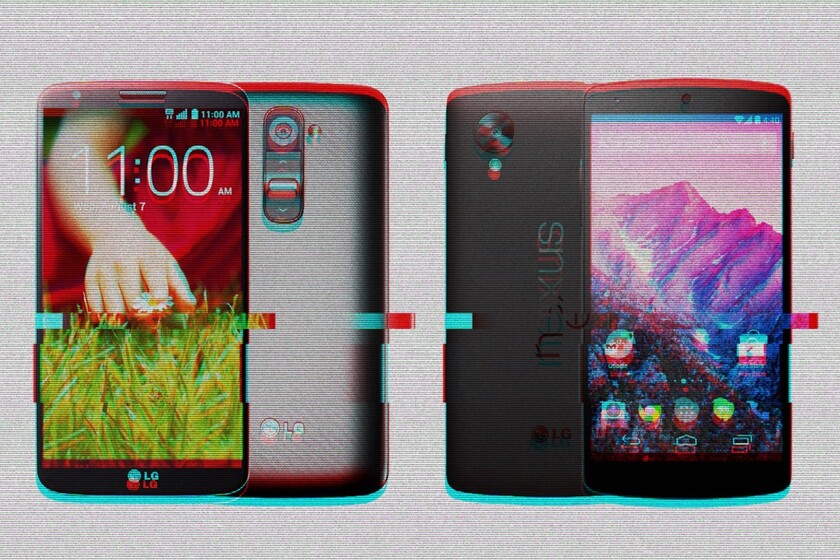Very sad news which has been confirmed today. LG leaves the mobile market. The CEO of LG valued that possibility months ago, and it has finally been decided that LG’s mobile division close on July 31st of 2021.
The decision is totally logical from a business point of view. LG did not stop trying to be relevant in this market with (perhaps too) original bets, but none of them ended up curdling. The situation contrasts with that splendid past that allowed us to enjoy exceptional mobiles like the Nexus 5 of 2013 and, of course, that LG G2 that did not manage to have continuity in later models of that family.
When LG made phones that we all wanted to have
Google already came from a splendid Nexus 4 (I asked for it at Christmas 2012, but the Three Wise Men did not bring it to me), but with the Nexus 5 curled the curl. It managed to significantly improve its predecessor without the price skyrocketing, and made it a mobile that is impossible not to recommend.
It did not matter the battle with the chollotefonos began to get complicated already at that time. The Xiaomi Mi3 began to make noise although it was very difficult to get them (how the story has changed), but the Nexus 5 was actually a double bet.

It was because at the same time the LG G2 was presented, which was named phone of the year in some media, although it was not spared from criticism either. For example, to renounce the glass that had been the differential note of the Optimus G to move to that plastic casing that was not typical of a “premium” terminal.
The materials debate was very much in vogue at the time, but the truth is that both terminals were fantastic in their proposed hardware —With a Snapdragon 800 that dominated the high-end market — and they also already offered a remarkable software experience in which, for example, we were beginning to get used to being able to say “OK Google” to the mobile.
That of talking to the mobile (in this case, to the Nexus 5 in which that option debuted) was “useful, but slightly puzzling“at the end of 2013. Things have changed a lot 7 and a half years later, and the strange thing is not talking (a little) to the mobile.
Both terminals were undoubtedly great options for any user, and the competitors at the time (Sony Xperia Z1, HTC One, Samsung Galaxy S4) were certainly great but more expensive: LG’s commitment to both collaborating with Google and offering its terminal it was make it very palatable to the general public.
From the Nexus 5 and the LG G2 to the precipice: LG kept losing money on mobile phones
That, unfortunately, did not help much, because later generations of the LG G family ended up following an erratic path: while others like Samsung were betting on more boring but effective iterative improvements, at LG they decided to innovate in risky areas that did not quite catch up with users. That was the beginning of the end.

E LG G5 and its commitment to modularity. Courage that did not receive an award.
It certainly did not help that Google changed partners and joined forces with Motorola to launch a Nexus 6 that changed philosophy (much more expensive) and did not convince too many people. The LG G3 was big (in our review we actually highlighted as a negative point that its 5.5-inch screen was too big) but did not contribute other fundamental differences with the competition still rising in price significantly.

Successive years only made things worse. LG was beginning its stage of experiments: often original and brave, but almost always without remarkable results.

Graphic: Javier Lacort.
Sales suffered and that part of the business it was less and less relevant in revenue despite involving a huge effort in areas such as research and development or marketing.
This was also noticeable in the financial results: the benefits that were perceived with launches such as those of the aforementioned Nexus 5 and LG G2 ended turning into losses in subsequent years.

Graphic: Javier Lacort.
The successive terminals were relatively successful in that although the division’s income was maintained and even rose until the beginning of 2018, ended up plummeting into a total slowdown which was making it clear that LG were reducing their bet to try to reduce that hole in which their mobiles had become.
The truth is that the news is a real jug of cold water for many users who followed finding great allies in mobiles of the G or V ranges in all kinds of areas. The mobility segment is certainly more competitive than ever, and in fact the shadow of a similar shutdown has long threatened other “classics” on the market.
In fact, Rick Osterloth, then CEO of Motorola and now a senior manager at Google, claimed that in 2021 Sony or HTC would cease to be in this segment. The funny thing is that then praised the LG G5 and its commitment to a modular design which was certainly a brave and risky idea that did not quite come to fruition. Too bad, LG. What a pity.

